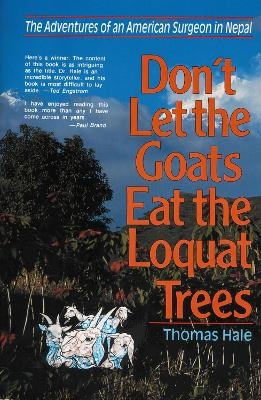
Don't Let the Goats Eat the Loquat Trees
Zondervan (Verlag)
978-0-310-21301-7 (ISBN)
Thomas Hale writes about being a missionary surgeon in the same delightful way James Herriot writes about being a country veterinarian. Dr. Hale's incredible experience in tiny, mountainous Nepal are surpassed only by his talent for telling about them. Imagine, for example, the culture shock of moving to a Hindu country under such rigid religious control that it is not only illegal to proselytize, but illegal to change religions as well. Imagine further the shock of moving to that country as a missionary doctor. Thomas Hale and his wife, Cynthia, also a physician, too on that awesome challenge in 1970.God wasted no time teaching tom the peculiarities of his new culture. But His unusual method left Tom wondering what God was up to. Here is how Tom tells about it:"These were not the phlegmatic, easy-going Nepalis described in books and orientation courses. Those who spoke gesticulated fiercely. Some looked around menacingly; others spat. One thing was certain, however: in the cause of their anger they were united. The word was out: the new doctor had killed a cow. My own sense of participation in the proceedings was intense. I was the new doctor."--ExcerptAs Tom goes on to describe the events the preceded the angry scene in the Nepali village, the image of the spiritually superior missionary quickly evaporates. In a humorous, yet deeply insightful way, the author makes it clear that he is merely a servant, using his skills to the glory of God.Tom concludes this chapter with a thoughtful confession:"In the long run, that cow did much more for me that I did for it. The mild-mannered, uncritical beast made me see in myself those negative attributes I had always ascribed to other American surgeons. Facing two hundred angry men proved to be effective therapy for removing most traces of condescension with which I previously regarded them. It also improved my relations with missionary colleagues and with Nepali brothers and sisters in the church. I guess God had no gentler way of removing some of my imperfections. I only wish I could say, for His trouble, that He finished the job. But it was a start." -- Excerpt.Dr. Hale's book refused to be preachy or condescending. It presents missions as a "want" rather than an "ought." It is sensitive, warm, honest, incredibly funny, and filled with important truths illustrated from unusual and sometimes unimaginable situations.
In 1970, Thomas Hale and his wife, Cynthia, went to Nepal to work for their first twelve years at a rural mission hospital in the village of Amp Pipal. Subsequently they moved to Kathmandu, Nepal's capital city, where they have continued their work with the mission. Recently Cynthia took a position as an associate professor at Nepal's only medical school, and Tom has written a one-volume commentary on the New Testament, first in Nepali and subsequently in English for translation into other languages.
CONTENTS
introduction
The Road to Nepal
one
Scrap Metal
two
Amp Pipal
three
New Doctor on Trial
four
A Matter of Character
five
A Matter of Adjustment
six
Modern Medicine Comes to the Hills
seven
Krishna
eight
The Doctor Knows Best
nine
Favorite Bus Rides
ten
Govinda Devkota
eleven
Nirmala
twelve
The Flood
thirteen
Administrative Capers
fourteen
Discipline
fifteen
Demonstrations and Strikes
sixteen
Tila Kumari
seventeen
Maya Gurseni
eighteen
Shaktaman Ghale
nineteen
Not Enough Money
twenty
Too Much Work
twenty-one
An Abundant Life
afterword
Five Loaves and Two Fish
| Erscheint lt. Verlag | 16.6.1986 |
|---|---|
| Verlagsort | Grand Rapids |
| Sprache | englisch |
| Maße | 139 x 216 mm |
| Gewicht | 271 g |
| Themenwelt | Literatur ► Biografien / Erfahrungsberichte |
| Reisen ► Reiseberichte ► Asien | |
| Religion / Theologie ► Christentum ► Kirchengeschichte | |
| Medizin / Pharmazie ► Allgemeines / Lexika | |
| ISBN-10 | 0-310-21301-0 / 0310213010 |
| ISBN-13 | 978-0-310-21301-7 / 9780310213017 |
| Zustand | Neuware |
| Haben Sie eine Frage zum Produkt? |
aus dem Bereich


